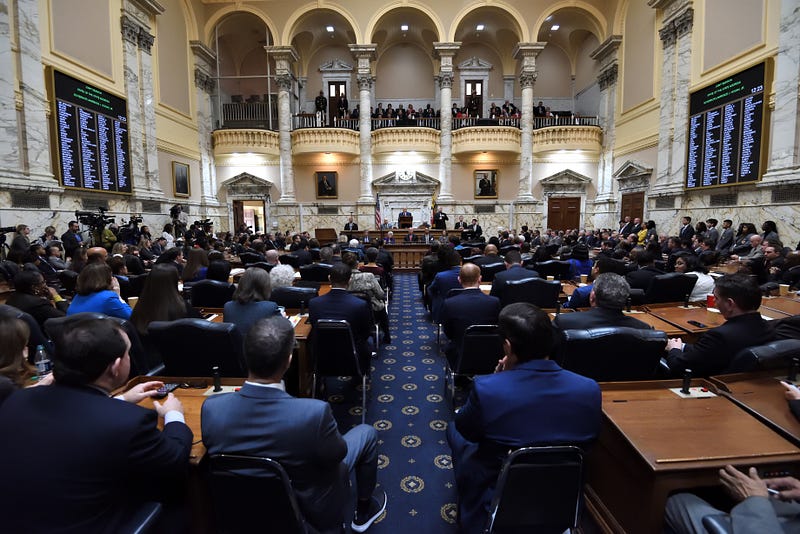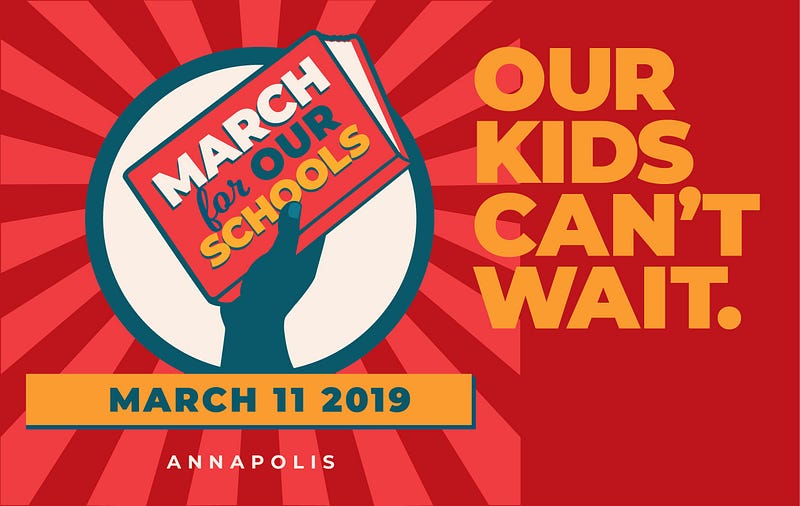State of the State Tops Another Busy Week in Annapolis
And other legislative updates in this week’s Up the Street

THIS WEEK IN ANNAPOLIS
Nothing New in Hogan’s State of the State
Despite teasing a new major tax cut proposal earlier in the week, Gov. Hogan announced no new policy proposals in his annual State of the State speech before the General Assembly. Instead, he touted an already-proposed package of targeted tax relief for businesses, retirees, and college graduates with student loans that would cost the state more than $500 million a year in lost revenue. These tax expenditures — aimed at specific populations and business interests — would make it much more difficult for the state to increase public education funding for all children.
The governor also highlighted his legislation to create an inspector general in the Maryland State Department of Education — chosen by his political appointees — to investigate local school systems. The same legislation failed to pass last session and MSEA will work to defeat it again this year.
House Majority Leader Kathleen Dumais (D-Montgomery-District 15) gave the Democratic response and made education a key priority for Democratic leaders in the General Assembly. In reference to the need to create and pass a new funding formula, she said, “There will never be a magical right time to invest in our students. The right time is now,” and went on to say the legislature will work on passing a “policy framework” developed by the Kirwan Commission. Hogan made no mention of the commission in his speech.
Senate Committee Discusses Flexibility for School Calendars
More than halfway through the second school year under Gov. Hogan’s post-Labor Day school start mandate, lawmakers are considering legislation that would effectively repeal the governor’s flawed executive order. Sens. Paul Pinsky (D-Prince George’s-District 20) and Nancy King (D-Montgomery-District 39), both influential Senate committee chairs, presented their bill before the Senate Education, Health, and Environmental Affairs (EHEA) Committee on Wednesday.
MSEA testified — in person and in writing — in support of this legislation, arguing, “Start and end dates on a school calendar should not be decided by gubernatorial edict, by the profit margins of the tourism industry, or by gauzy personal nostalgia; rather it should be decided by local calendar committees and boards of education that must account for a myriad of factors, but primarily rooted in what it takes to improve academic achievement for students.”
House Appropriations Hold Hearing on Private School Vouchers Program
While the Senate EHEA Committee was discussing local control of school calendars, a House Appropriations subcommittee held a hearing on the state’s private school voucher program, known as BOOST. Gov. Hogan’s FY2020 budget reserves $10 million for the program, a $3 million increase from the $7 million it received in FY2019. This is despite the fact that there is no evidence showing an improvement in educational outcomes for students who switch from public to private school through the program (in fact, research from other states shows students too often lose ground in math and reading).
MSEA testified before the subcommittee in opposition to the funding, citing the research showing voucher programs are not just ineffective but actually harmful to students’ learning, pointing out that the vast majority of students in the program already attended private school before receiving vouchers, and showing how problems in private schools — from the high percentages of uncertified teachers to the use of outdated assessments and curricula to discrimination against both students and staff — are completely unaccountable to the state.
As members of the General Assembly work to close the gap between funding available for Kirwan Commission recommendations in the governor’s budget and what the Commission actually recommended, we know a good place for them to start: eliminating the BOOST program and re-directing its $10 million back to public schools.
REMINDER: Sign Up for March For Our Schools
To win on competitive salaries, adequate staffing levels, expanded pre-K and CTE, more equitable funding, and more, we need to show up and unify our voices for a new funding formula. That’s why we hope you will join thousands of educators (and parents, students, and other public education allies) for the March for Our Schools on March 11. RSVP here and then recruit five or more of your friends today.

NEWS AND NOTES
Democratic Leadership Announces 2019 Priorities
A day before Hogan’s State of the State, Democratic leadership in both the House and Senate joined together to announce their 2019 legislative priorities: creating a Prescription Drug Affordability Board, prohibiting health insurance companies from declining insurance because of pre-existing conditions, raising the minimum wage to $15 an hour, raising the tobacco purchasing age from 18 to 21, banning 3D and ghost guns, expanding the child care tax credit, and banning Styrofoam.
Though a down payment on Kirwan Commission priorities was not on the list, several speakers at the press conference mentioned school funding and Senate President Mike Miller (D-Calvert, Charles & Prince George’s, District 27) promised there would be a separate announcement on education in the coming weeks.
2018 Kindergarten Readiness Assessment Results Released
Last week, the Maryland State Department of Education (MSDE) released results from the Fall 2018 Kindergarten Readiness Assessment (KRA), showing just under half of all kindergarteners arrived ready for the grade level. This year, 14 of the state’s 24 school districts gave the KRA to each student despite the fact that most teachers do not find the assessment helpful for improving instruction. The state’s larger school districts, including Baltimore, Montgomery, and Prince George’s counties, instead give the assessment to a sample of students as allowed under legislation MSEA helped pass in 2016.
This school year’s administration of the assessment was the fifth year it has been given and the first year using “KRA 2.0.” MSDE has tried to shorten the test, but many kindergarten teachers still find it developmentally inappropriate for five-year-olds, extremely disruptive of crucial early-year instruction, and plagued by some of the same technological and logistical problems as the original test.
A LOOK AHEAD
Hearings on $15 Minimum Wage, Teachers on the State Board, and Hogan’s “Accountability” Bill
MSEA will be testifying on a number of important bills next week, including:
· Hogan “Accountability” Bill (SB92, Wednesday, 2/6 in Senate EHEA): This bill would create an inspector general, chosen by Gov. Hogan’s political appointees, to investigate public school systems for the purpose of creating negative publicity about our public education system. MSEA will oppose.
· Teachers on State Board (HB87, Thursday, 2/7 in House Ways and Means): This legislation — one of our priority bills — adds two teachers (elected by all teachers in the state) and one parent to the State Board of Education.
· Fight for $15 (HB166, Friday, 2/8 in House Economic Matters): This legislation would increase the minimum wage to $15 an hour by 2023 and is one of MSEA’s 2019 legislative priorities because it will raise the wages of many education support professionals.

